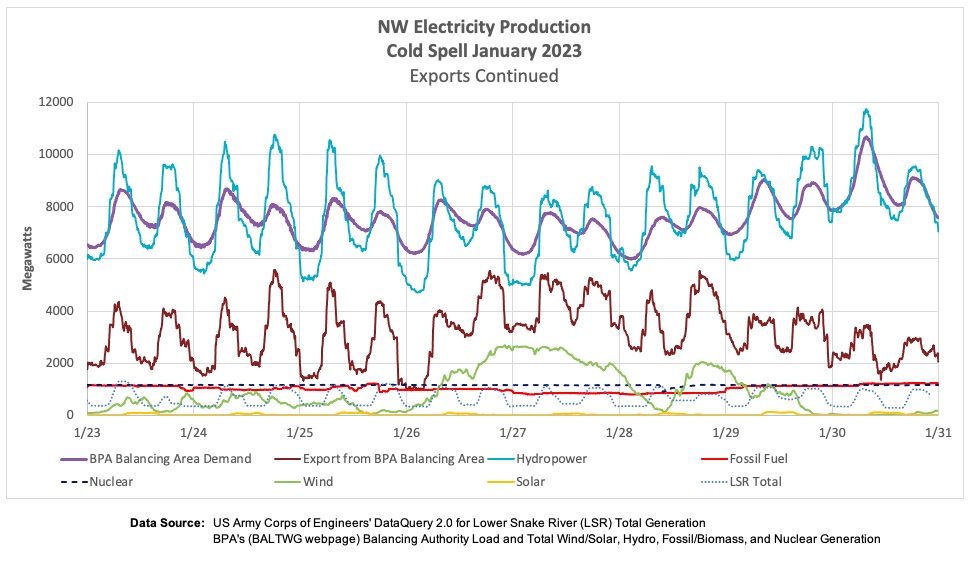forum
library
tutorial
contact

Salmon Won't Survive Unless
Lower Snake River Dams are Removed
by Jerry Freilich
Bend Bulletin, April 21, 2023
|
the film forum library tutorial contact |

|
Salmon Won't Survive Unless
by Jerry Freilich
|
Solar, wind and battery technologies continue to improve, driving down costs every year.
 On April 14, I attended the annual meeting of the Central Oregon Electric Cooperative at the Deschutes County Fairgrounds. At the meeting, Dave Markham, the co-op's president and CEO, told us that the four Lower Snake River Dams (LSRDs) keep us from being in the dark. Actually, it is Mr. Markham who is in the dark.
On April 14, I attended the annual meeting of the Central Oregon Electric Cooperative at the Deschutes County Fairgrounds. At the meeting, Dave Markham, the co-op's president and CEO, told us that the four Lower Snake River Dams (LSRDs) keep us from being in the dark. Actually, it is Mr. Markham who is in the dark.
The four LSRDs in eastern Washington have driven Snake and Columbia Basin salmon to near extinction. All populations are now on the Endangered Species List. When the dams were built, starting in the 1960s, scientists knew that they would harm what used to be the nation's most spectacular salmon fishery. The scientists were right and today the salmon continue their disastrous decline year after year.
In a lawsuit running over 20 years, the courts have found in favor of the plaintiffs (the state of Oregon and the Nez Perce Indian Tribe) and against the U.S. government seven times. Each time, the court ruled that the government had failed to protect the fish as required by the Endangered Species Act. Now in its eighth iteration, the lawsuit continues today as the fish plunge to extinction. The LSRDs simply must be breached or the fish are doomed.
Without ever mentioning fish, Mr. Markham declared that "special interests" were trying to take down the dams. Can salmon be considered "special interests"?
Mr. Markham went on to say that it was unfeasible to replace "reliable, low-cost, carbon-free hydropower" with "unreliable sources like solar and wind without consequences of blackouts." Let's talk about those assertions.
First of all, most hydropower comes in springtime with winter snowmelt. In the heat of summer and dead of winter when power is most needed, rivers flow less and dams produce less power. There are other problems.
The water in reservoirs behind the dams is slow-moving. Climate change warming reduces oxygen levels in the reservoirs and that slow-moving, poorly oxygenated water becomes a death trap for the baby salmon trying to escape to sea. In addition, the reservoirs release large amounts of methane, a potent source of atmospheric carbon. The dams are not "carbon-free."
And about low-cost reliable power? Hydropower is expensive and its price continues to rise. Turbines in the dams now need replacement, which will cost of tens of millions. Meanwhile, solar, wind and battery technologies continue to improve, driving down costs every year. Even now, renewable energy costs are lower than hydro and that trend will continue steadily.
Despite Markham's contentions, renewable energy will not leave us in the dark, even without wind or sun. Because the national power grid is interlinked, "reserve energy" is always available somewhere in the nation. In fact, reserve energy from renewable sources is already online to cover the dams several times over.
Markham alluded to a winter cold snap in Texas that caused millions to lose power. That did happen. But it happened because the Texas power grid was not connected to the national system. That's what prolonged the blackouts.
Batteries can provide energy when necessary, but they don't need to shoulder the load alone. Markham said we'd need "thousands of acres of batteries." That was just wild exaggeration. Battery technology is improving rapidly. For example, readers might look at Tesla's MegaPack site at tesla.com/en_eu/megapack.
Markham showed two graphs intended to show how "scientifically" the co-op looks at things. His graphs showed a single seven-day period in January when renewables did not cover all the needed energy. Sorry, Dave, but that's not science and scientists like me find this sort of fudging-by-omission simply laughable.
To top off the day, the co-op provided some food for attendees. Was it bitter irony, deliberate cynicism or complete tone-deafness to offer us salmon sandwiches for lunch? Perhaps it was farmed Atlantic salmon?
Markham announced he will retire soon. Hopefully his successor will turn on the lights. Breach the dams!
Related Pages:
Facts About the Lower Snake River Dams by Jerry Freilich, Bend Bulletin, 8/22/22

learn more on topics covered in the film
see the video
read the script
learn the songs
discussion forum
